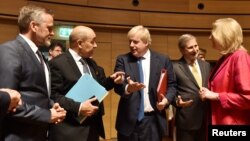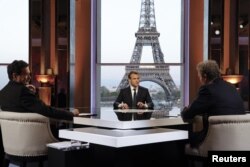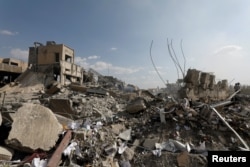European foreign ministers and France’s parliament meet Monday to discuss their response to the joint U.S., French and British strikes on Syria. The military action has sparked sharp divisions, even though French President Emmanuel Macron insisted Sunday night they carried international legitimacy.
EU foreign ministers in Luxembourg and France’s parliament in Paris are expected to question, but not seriously test, the decision by French and British leaders to join Washington in striking suspected chemical weapons facilities in Syria. Some EU leaders, like Germany’s Angela Merkel, have called the military action necessary — and the bigger debate may be on figuring out Europe’s response to Syria’s ally, Russia.
In France, several leading opposition politicians have sharply criticized French involvement in the strikes. But Monday’s parliamentary session on Syria will be limited to a debate only — and French President Emmanuel Macron’s La Republique En Marche party dominates the National Assembly.
During a televised interview Sunday night, Macron said the coalition had "full international legitimacy to intervene" in striking Syria for humanitarian reasons. He called the action a retaliation, not an act of war, and said France had proof chemical weapons had been used by the Syrian government during a recent attack on the rebel-held town of Douma. He also said France has "not declared war on the regime of Bashar al-Assad."
Macron said he had convinced President Donald Trump to keep U.S. forces in Syria — a version later disputed by the White House — and to carry out only limited strikes.
While Washington and its European allies are united over the strikes, they may be divided over how to proceed.
Macron called Russia “complicit” in the alleged chemical attacks, by using diplomatic means to render the international community incapable of responding to them. But he also said it was important to work together with Russia, Turkey and Iran in finding a solution to the Syrian crisis. Macron and President Trump are due to hold talks in Washington next week.






